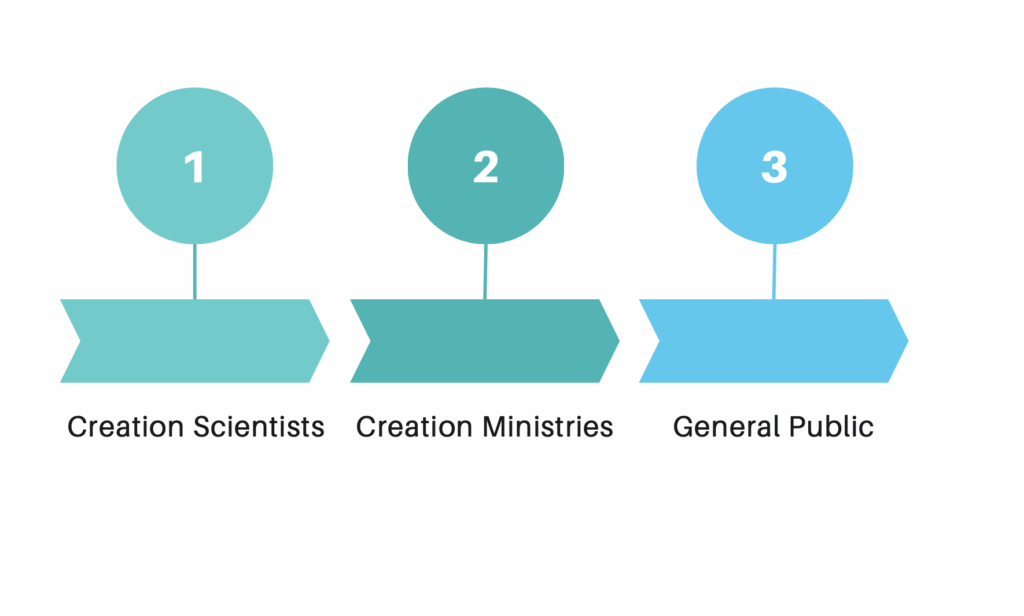In his article entitled “Quo Vadis?: Some Reflections on the State of Creationism,” Hans Madueme expounds on the current state of creationism. Madueme approaches creationism from the standpoint of theological studies. He examines the current state and the future of creationism.
The following article is a summary of “Quo Vadis? Some Reflections on the State of Creationism,” by Hans Madueme, and of the surrounding discussion and research pertaining to it. The views expressed do not necessarily reflect those of New Creation.
Personality Quirks
If you have met more than one or two creationists, you have likely encountered at least one with a quirky personality. After years of swimming against the stream, they developed thick skin. They learned to be combative, sticking up for their beliefs against all opposition. Some creationists have become so entrenched in their views that they consider everyone who differs even slightly from their views, even fellow creationists, as the enemy. While a prickly personality is forgivable, creationists as a group should not be known as odd ducks. Their primary trait should be a calm, cheerful passion about their theological views. This is because they have truth on their side.

Madueme goes on to distinguish between eccentric and awkward. Eccentric creationists add colorful diversity to the field. Awkward creationists, on the other hand, are those that do not play well with others. This kind of awkwardness creates division among creationists. There is a remedy. Creationists should make an effort to engage in friendly interactions with those they disagree with.
Peace amongst Creationists
The next topic that Madueme addresses is closely related to the first. Like individual creationists, creation ministries tend to hold tightly to specific beliefs. Large organizations that present creationist material to lay people have carried the creationist movement for decades. They are good at what they do. But, because they operate at a lay level, they are not always equipped to enter the scientific arena. Instead of absorbing new scientific discoveries in creationism, they can tend to hold to their older views and consider creation scientists as the enemy if they present new and differing ideas. This can cause antagonism between creation ministries and creation scientists.
Madueme suggests that instead of fighting between the two groups, it is better to recognize that each functions in a unique role. Creation scientists should continue to further the scientific aspects of creationism, while creation ministries should continue to present creationism at the lay level. There is an opportunity for great harmony between the two categories of creationists. Although there may be disagreement, creationists should not tear down other creationists.

New Creationism
Amongst conservative American Christianity, there has been a certain skepticism of academic pursuits. University-trained scientists and even theologians are sometimes seen as having been tainted by the system. While universities often promote anti-biblical views, anti-intellectualism throws out the good with the bad in secondary education. If creationists wish to further creationism as a science they must become educated in an aspect of science such as biology, geology, etc. In the past, creationism has centered on a lay-level presentation of science that is typically strongly influenced by theology. And, while theology-driven creationism within creationist ministries certainly serves an important purpose, it has grown stagnant. This is where New Creationism comes in. Madueme recognizes seven key traits of New Creationists:

1) They tend to engage in gracious conversation with other creationists and with non-creationists.
2) They are likely to be involved in academia.
3) They use an academic approach when tackling questions.
4) They are comfortable with saying, “I don’t know,” and working to find answers to the questions for which they don’t have an answer.
5) They are driven by curiosity and a desire to build creationist models consistent with both scripture and science.
6) They are willing to accept principles that are foundational to evolution if there is good evidence for them.
7) They neither fear nor discourage new discoveries.
New Creationists are the future of creationism. Instead of poking holes in evolution from a distance, they engage with evolutionists on their own turf. They diligently study and perform scientific research to build solidly scientific models of creationism.
Epistemology

Epistemology is the study of knowledge. How do we know things? Most creationists, and conservative biblical scholars in general, start with the word of God as the foundation of knowledge. In simplified terms, this can take the form of: “the Bible is true. We don’t need to trust mainstream scientists because their work is not founded on God’s word.” However, this is a false dichotomy. Just because the word of God is true, it does not necessarily follow that everything else is false. Non-christians can discover truths about the universe. In doing so, they are discovering something of God, because God is the author of truth.
Creationists do not need to be afraid to accept the scientific findings of secular scientists as truth. However, they should also be cautious, since the very nature of science makes it a work in progress, and not everything presented by a scientist is necessarily true. Creationists can assume that any scientific discovery that is directly contrary to God’s Word must be incorrect. However, a scientific discovery that is contrary to a creationist’s interpretation of Scripture or a creation model may be correct and the creationist’s interpretation may be wrong.
Missing Theologians
The New Creation movement has brought a wave of exciting work among creation scientists. Creation theologians, on the other hand, are noticeably absent. Most theological creationism falls to the realm of creation ministries. Most of this work is published in magazines that appeal to lay-level readers. Academic theologians are unlikely to take such articles seriously if they happen to come across one. Academic theological journals, on the other hand, are seriously lacking when it comes to creationism. Perhaps this is because theologians view the issues of creationism as settled, with nothing new to discuss. But Madueme argues that there are untouched rich depths in creation theology. He urges creation theologists to step up and bring creationism to the academic arena in theology. And some are. The newly-formed Creation Theology Society is dedicated to just this.
Conclusion
Madueme concludes with a reminder that creationism is hard. A lot of creationists are hard to get along with, and there are tensions between creation ministries and creation scientists. And, there are challenges in searching for truth and in linking creationism with theology. But we must overcome creationism’s challenges, because the best days of creationism are yet to come.







This is an interesting summary article. One that contains strange statements and thoughts. I don’t mean to insult when I say that. Let me explain.
Modern Creationism as a movement within Christianity as been steadily progressing since The Genesis Flood by Henry Morris and John Whitcomb. As far as I can tell, the movement doesn’t seem to have stagnated at any point in the last thirty years. Why the need for this “New Creationism”? Where is the evidence for theology-driven creationism becoming stagnant?
Another point of contention I have is the model that this summary article presents regarding the relationship between creation scientists, creation ministries, and the general public. Which creation ministries are holding to older views and viewing creation scientists as “the enemy”? Is that a call out of AIG’s articles concerning young earth evolution?
The three biggest Creationist organizations I can think of are Answers In Genesis (AIG), Institute for Creation Research (ICR), and Creation Ministries International (CMI). All of which have Creation scientists actively working inside of their organizations. So what is an example of a Creationist ministry/organization that is holding to an old view and not paying heed to the work done by Creation scientists as stated in this article?
The most baffling aspect of this article is point number six of the list of seven traits of “New Creationists.” It reads: “They are willing to accept principles that are foundational to evolution if there is good evidence for them.” I hardly know where to start with this. The dichotomy often presented by Ken Ham is that the debate between Christianity and Evolution is between God’s Word and man’s word. I believe that is eloquently put. Any principles that a Christian Creationist might be willing to accept that are simultaneously foundational to evolution are principles pertaining to biology. There is not a single aspect of the methodological naturalism that underpins modern evolution is that a Creation scientists, a Christian studying God’s Creation, would want to accept. Is point number six suggesting that natural selection is a principle of evolution? CMI has pointed out that natural selection was identified by a creationist before Darwin. Furthermore, that’s even conceding that natural selection is an actual phenomenon which ICR disputes and I believe they may have a point. My point in bringing up the distinction between God’s Word and man’s word is that Christians use the Bible, God’s Word, as their starting point and scientists who aren’t Christian use man’s word (theories, philosophies, ideologies, etc.) as their starting point. The principles of evolution are based on man’s word so there are none that a Creation scientist should accept. In so saying, what is an example of a principle of evolution that there is evidence for that a Creation scientist should accept?
In relation to theological creationism, doesn’t the Journal of Creation have essays and articles addressing the aforementioned discipline? I agree that there could certainly be more work done but I don’t think that there is no work being done.
Last but not least, though most Creation Ministries/organizations may operate at a lay level that doesn’t mean that they aren’t concerned with the truth and keeping up to date with the latest science.
I’m all for having productive dialogue and the other points mentioned in the list of traits are mostly good but the problems I have raised make me question this summary article and the author of the original article.
Hi Clive,
I appreciate your comments. As you correctly noted, this is a summary of an article by a different author, so I can only respond from my own perspective. I can’t answer on behalf of the original author other than to clarify a few things that I didn’t have room to include in the summary.
Regarding stagnation within creationism, it may have been overstated in the article, and there certainly has been some scientific work done within creation ministries. For example, Andrew Snelling’s work on the Tonto Group and ICR’s cave fish research. However, the nature of creation ministries causes them to use more of an apologetic perspective than a scientific perspective, and I think Madueme is arguing that there is room for much more scientific research within creationist circles.
Regarding accepting principles foundational to evolution, that is not to say that creationists need to accept philosophical naturalism. I like your example of natural selection because it illustrates a topic on which creationists are divided. Creationists should not be afraid of natural selection because there is evidence of it. What we are concerned about is creationists denying something simply on the basis of its association with the theory of evolution. We should accept or deny a theory based on evidence that is consistent with Scripture. New Creationists apply this principle to other topics, for example, the issue of feathered dinosaurs. Just because an evolutionist discovered or accepts a scientific principle, it does not mean it is wrong. Generally, creationists will interpret data differently than evolutionists will, but they can both work from the same data.
Regarding bridging theology and creationism, I think Madueme is arguing that it does not occur enough. Theological articles in creationist journals are an excellent start, but discussions on creationism should also be present in theological circles outside of mainstream creationism.
Thank you for your reply.
You bring up a good point when you say that Creationist ministries operate from an apologetic perspective than a scientific perspective. The main objective of these organizations isn’t to probe the edges of scientific research. Once again though, that is not to say that they aren’t concerned with the truth whether biblical or scientific or otherwise. There is certainly room for more scientific research within Creationist circles, I don’t think anyone would disagree with that.
I don’t think there are Creationists who are ‘afraid’ of natural selection but there are certainly Creationists who believe that it is bereft of explanatory power. Furthermore, CMI has documented that the principle of natural selection was already documented prior to Darwin so those who have a problem with it because of evolution should look at the development of the idea.
Feathered dinosaurs are an interesting topic because I have seen good presentations from both sides of the argument. There is room for further discussion on that issue. I am unsure as to the existence or non-existence of feathered dinosaurs.
“Just because an evolutionist discovered or accepts a scientific principle, it does not mean it is wrong.” I agree. I don’t think most Creationists would disagree with that. However, the precise meaning of the term ‘scientific principle’ and what qualifies as such would be a major determining factor.
Lastly, I agree that discussions on creationism should occur more frequently outside of mainstream Creationism.
The main evolutionary mechanisms of natural selection, mutation, gene flow and genetic drift are all observed phenomenon.
The processes that you have listed do not qualify as “evolutionary mechanisms” because evolution has not occurred. None of those mechanisms *add* information to the genome, which is necessary for evolution to occur.
It seems like you are arguing that when a new organism is born, if it has an identical genome to its parents (or at least, a combination of the two), that no new information has been created.
I argue that is false, a whole new organism has been created! I, as a human, have 26 chromosomes. All 26 are “new” chromosomes.
Think of it like copying a piece of text. Imagine if I wrote a 1000 word short story, then copied it to another piece of paper. I have now written 2000 words. It doesn’t matter that the second half of the content is identical to the first half, it still doubled the amount of information.
Hopefully that shows how “new information” is regularly created in nature!